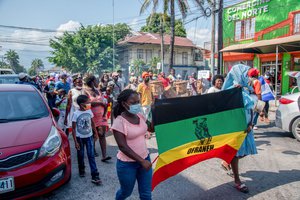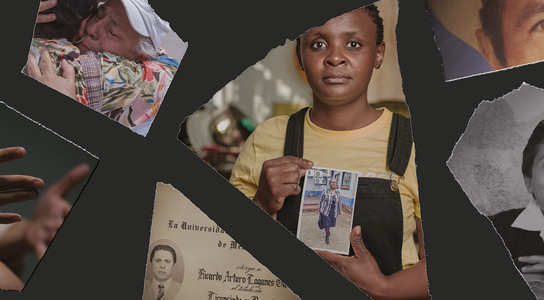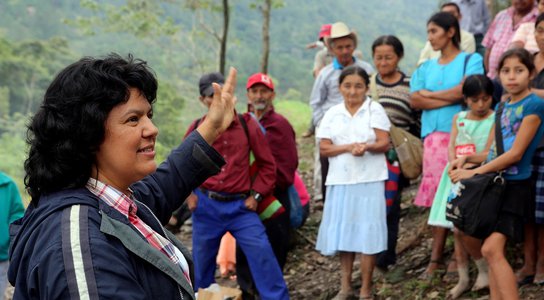On 18 July 2020, a group of thirty heavily armed men bearing police insignia entered the homes of four young men – Milton Martínez, Suami Mejía, Gerardo Róchez and Sneider Centeno – in the community of Triunfo de la Cruz. The young men, members of the Garífuna people, were seized and taken away. Twelve months later, their whereabouts are still unknown.
The land they call home along Honduras’s north coast has long been coveted by businessmen, local politicians and organised crime groups who have collaborated with the authorities to try and gain ownership of the Garífuna’s ancestral territories.
To resist this encroachment on their territorial rights, in 1978 the community established The Black Fraternal Organization of Honduras (OFRANEH by its acronym in Spanish), of which the four abducted men are members. For standing up against powerful commercial interests, members of the organisation and the wider Garífuna community have become targets of an orchestrated campaign to put an end to their activism.
Representatives of OFRANEH sum up their treatment, in a pattern all-too familiar to land and environmental defenders worldwide:First they harass and threaten, then they go on to criminalise, and when that doesn't work, they proceed to murder.

OFRANEH members protest against a proposed economic development zone that would forcibly relocate coastal communities. Seth Sidney Berry/SOPA Images/LightRocket via Getty Images
A hostile environment for Indigenous defenders
In previous years, there have been attempts to evict the Garífuna from their lands to make way for a luxury tourist development in Barra Vieja on Honduras’s Caribbean coast. After redrawing the boundaries of the national park to make way for the development, the Honduran government brought legal charges against the Garífuna people living in the area, accusing them of illegally occupying lands. After a lengthy legal battle, the Garífuna were cleared of all wrongdoing in July 2015.
At the same time, the Inter-American Court on Human Rights ruled that the Honduran government had violated the rights of the Garífuna in a separate case along the same stretch of coastline. Yet despite this, the government still refuses to recognise the Garifuna’s rights, and their treatment has only worsened.
Honduras is an extremely hazardous country to stand up for the environment. According to our most recent data for 2019, Honduras was the most dangerous country in the world per capita to be a land and environmental defender, and the fifth most dangerous country by total number of killings.
Indigenous communities such as the Garífuna are particularly at risk of reprisals as a result of their activism. Despite making up only 5% of the world’s population, in recent years Indigenous Peoples have consistently accounted for between 35-40% of land and environmental defenders killed worldwide.
Indigenous land rights must be protected
The role of Indigenous communities in tackling the climate crisis is often overlooked in high-level meetings amongst governments and policy-makers. Yet there is mounting evidence that they are some of the natural world’s most effective advocates.
While around a quarter of the Earth’s land is occupied by Indigenous Peoples, they are responsible for 35% of terrestrial areas with very low human impacts. The lands they steward help to maintain 80% of the world’s biodiversity and store hundreds of gigatons of carbon. It’s not hyperbole to say that without the vital work of these defenders, we stand no chance of tackling the climate crisis.
Yet it is their very effectiveness in standing up for the environment which brings them into conflict with powerful companies who wish to expand their extractivist business model onto Indigenous-owned land. That means more forest cut down to make way for plantations and pastures, more climate-wrecking fossil fuels dug out of the ground, and more ecosystems damaged beyond repair for the sake of profit.
To safeguard the environment, and to ensure the safety and dignity of Indigenous Peoples around the world, their territorial rights must be respected. Those who seek to violate them through violence and intimidation must be held accountable.
In Honduras, that means recognising the Garífuna’s rights to their ancestral lands as required by the Inter-American Court on Human Rights, and protecting them against violence. It also means the safe return home of Milton, Suami, Gerado and Sneider, whose families are still waiting, and an investigation into the armed men bearing police insignia who abducted them.

